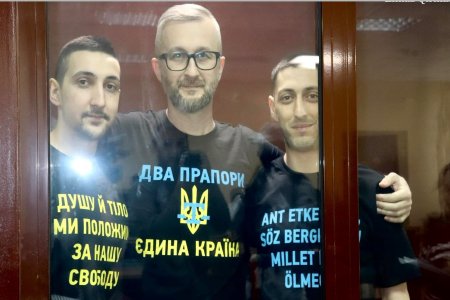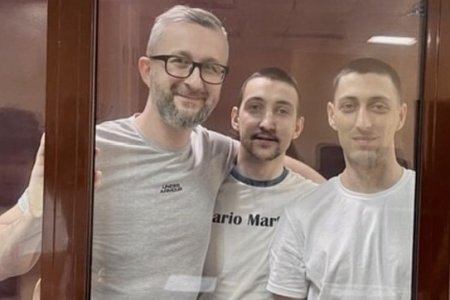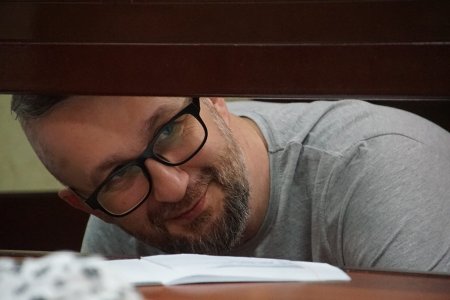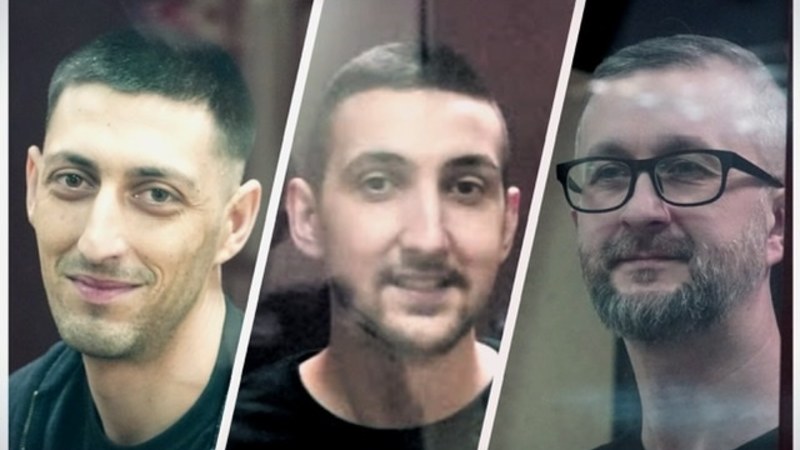
A ‘lawyer’ who simply watched on while the men he should have been representing were tortured by the FSB is finally facing disciplinary proceedings. It was only persistent complaints from at least one political prisoner that forced the occupation Crimean Chamber of Advocates to initiate the proceedings against Oleg Glushko and there is probably little chance that a ‘lawyer’ regularly appointed by the FSB in political cases will face the consequences he, undoubtedly, deserves in occupied Crimea. It is, nonetheless, important to ensure that all those implicated in Russia’s machine of repression are remembered and, at least, placed under international sanctions.
Since Russia’s invasion and annexation of Crimea, it has become standard for the FSB to take Ukrainian citizens prisoner, holding them incommunicado and denying them access to independent lawyers. During this period, the detained men are very often shown on FSB videos or Russian-controlled television ‘confessing’ to crimes which, in very many cases, differ radically from those with which they are eventually charged. The vast majority of such prisoners later retract these supposed ‘confessions’, saying that they were obtained through torture. It has, on several occasions, required the intervention of the European Court of Human Rights before prisoners were given access to the lawyers of their choice, with the FSB trying to impose their own appointed ‘lawyers’, who are there essentially to sign documents and, sometimes, to try to persuade prisoners to admit to the charges. Two such individuals are especially notorious in occupied Crimea: Oleg Glushko and Violetta Sineglazova. In both cases, these supposed lawyers work closely with the prosecution, turning a blind eye to torture and gross violations of the detained person’s rights.
The following are just two examples of Oleg Glushko’s dereliction of his duties as a defence lawyer.
The case of Nariman Dzhelyal, Asan Akhtemov and his cousin, Aziz Akhtemov
The arrests in September 2021 of Crimean Tatar Mejlis leader and journalist Nariman Dzhelyal and the two Akhtemovs received international condemnation from the outset, both because of their evident political motivation and because of the glaring violations of the men’s rights. Both Asan and Aziz Akhtemov were held incommunicado without access to independent lawyers for nine days, with their chosen lawyers only able to see them after the intervention of the European Court of Human Rights. Both cousins immediately retracted the ‘confessions’ they had been forced to give, and have provided detailed accounts of the methods used to extract them.
The FSB had appointed Oleg Glushko to ‘represent’ civic journalist Asan Akhtemov, and it is the latter who has been most persistent in seeking disciplinary measures against a person he says was present while he was being tortured and did nothing.
According to civic journalist Elmaz Qırıml, the disciplinary proceedings were due to be heard in occupied Crimea on 27 January 2023. There remains no information about them, however, in Asan Akhtemov’s case, they cover the period from 4 to 8 September 2021 when Glushko was his FSB-appointed ‘lawyer’.
According to Asan Akthemov, Glushko was present while he was being tortured by the FSB, including with the use of electric shocks. When, at one point, Asan turned to Glushko and asked why he was allowing such behaviour, the ‘lawyer’ responded that this was “standard procedure”. Glushko also took part in the detention hearing on 6 September, which Asan’s real lawyer, Aider Azamatov was prevented from attending. Later, during the ‘trial’, Glushko appeared as a ‘witness’, claiming that Akhtemov had not been tortured or placed under illegal duress. He further asserted that the interrogations had gone on without any break or food on Akhtemov’s own “voluntary initiative”.
Asan Akhtemov gave a very different picture, both to his real lawyer, and then to the ‘court’ in Russian-occupied Crimea. He explained that, following his effective abduction during the night from 3-4 September, he was taken to a basement where his captors attached electric wires to his earlobes, and sent electric currents through his body. During the breaks between sessions of this excruciating torture, the FSB threatened reprisals against his family. Once he agreed to do whatever the FSB demanded to end the torture, the FSB officers began carrying out various ‘investigative activities’ in which he gave false testimony against both himself and the other men. He explained that the FSB had videoed the same ‘confession’ or other ‘investigative activity’ several times, clearly adapting their fabrication of the case as they went (more details here). There had been at least three ‘interrogations’, for which he was forced to learn ‘the answers’ off by heart, being taken into the corridor and beaten if he got something wrong. It was during his testimony on 13 July 2022 that Asan clearly stated that Glushko had been present on one of these occasions.
Asan Akhtemov’s testimony is consistent with that of numerous other political prisoners. There is also no credible reason for denying a detainee access to lawyers of their choice and other rights unless the FSB are, with the connivance of individuals like Glushko, using his isolation to apply torture and other illegal methods of duress.
Rayim Aivazov
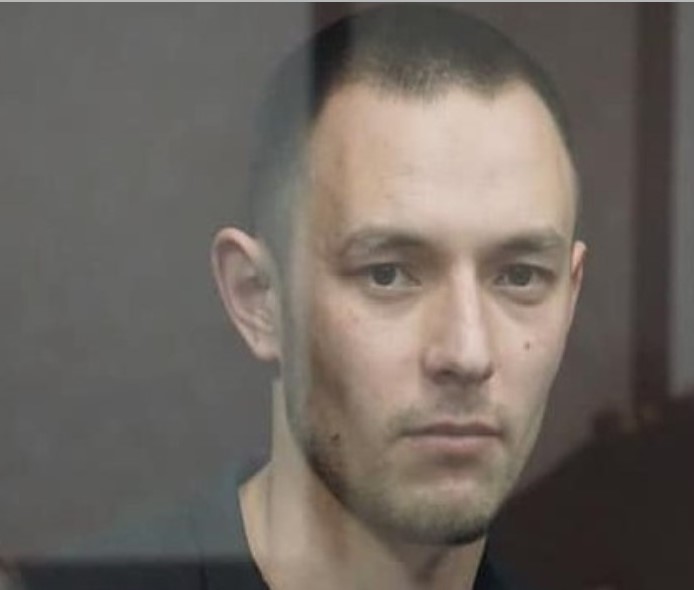
Aivazov is one of 25 Crimean Tatar civic journalists and activists, arrested either on 27 March 2019 or shortly afterwards. The arrests received international condemnation for Russia’s cynical use of ‘terrorism’ charges against men taking a civic stand and defending victims of repression.
Aivazov’s case is especially shocking because of the torture he was subjected to during the night after his ‘arrest’; the role played by Oleg Glushko during that period, and because of the overt reprisals he suffered after he refused to remain silent about the torture.
Aivazov was seized by the FSB at the administrative border between mainland Ukraine and occupied Crimea during the night of 16 April 2019. He had with him the IPhone 7 that he had received for his birthday in January and wrote a text message to his wife, saying that he seemed to be waiting too long. He then disappeared until he was allowed to briefly phone his sister the following afternoon. The phone itself was never found with ‘FSB investigator’ Sergei Makhnev, who has played a malignant role in multiple political cases, claiming that no telephone had been removed during the ‘arrest’. While one of the officers doubtless pocketed it, the phone would also corroborate the account given by Aivazov as soon as he was able to see an independent lawyer. During the ten hours when he was illegally held incommunicado, he was tortured by the FSB, with Oleg Glushko also present and exerting pressure on him to give false ‘testimony’ against the other civic journalists and activists.
It was after Aivazov formally retracted this ‘testimony’ and spoke, in front of his real lawyer, Maria Eismont, of the illegal methods used to extract it, that the FSB first warned him that he would, “in that case” face the harsher of the charges brought against the 25 men. This is indeed what happened, with clear evidence demonstrated to the court that one of the so-called ‘secret witnesses’ on which the entire prosecution hinged had changed his testimony after the worse charge was laid against Aivazov (details here).
Glushko was also the only ‘lawyer’ whom 61-year-old Ukrainian political prisoner Kostiantyn Shyrinh had before being sentenced to 12 years on extremely questionable ‘spying’ charges (details here).
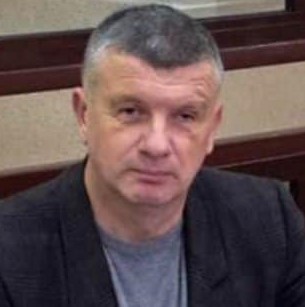
The list is, unfortunately, likely to be longer. Asan Akhtemov is not optimistic about the outcome of the disciplinary proceedings, and pessimism does, unfortunately, seem warranted. This is all the more reason to ensure internationally notoriety, and inclusion on sanctions lists, for all those, like Oleg Vladimirovich Glushko, who collaborate with the FSB in fabricating politically motivated prosecutions in occupied Crimea.
